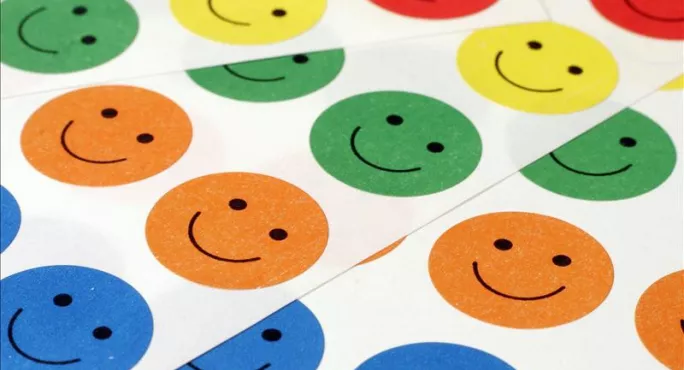Rewards: should we get rid of stickers?

The focus on self-regulation through the new early learning goals has prompted me to think about the use of rewards in school, and specifically the use of stickers.
I have always found using stickers as a reward quite fascinating, as there is such variety in teacher attitudes as well as children’s responses to stickers.
More from Helen Pinnington:
The other day, I was chatting to a girl in a Reception class and noticed a shiny star sticker on her jumper. I asked her about it and she told me that her teacher gave it to her for letters and sounds.
“You can have it if you like,” she said, and promptly peeled it off and handed it to me. I didn’t need to ask any more questions, her actions spoke volumes. She really wasn’t in the least bit bothered by a sticker.
If this example were an exception, then I might be wrong to question the use of stickers but, sadly, I don’t feel that they work for many reasons.
They are used inconsistently
They are often used too freely, without purpose and staff teams are inconsistent with their use.
I have seen a teaching assistant dishing stickers out like sweets to the challenge group for minimal reasons (they put their hand up frequently and are just being so clever), while in the next room, her colleague barely rewards any children of lower ability, who are working much harder. This isn’t a fair system and nor is it effective.
Children lack emotional maturity
Many young children really don’t grasp the concept of earning a sticker. Teachers can be really obvious when making an example of a child - “I’m sooooooo proud of Thomas, look at how hard he has been working to help tidy up” - yet another child will completely miss the point, asking directly: “Can I have a sticker?”
The teacher falls into a ridiculous situation, in which she tries to explain that she hasn’t yet noticed them doing anything wonderful to earn a sticker, by which point the child begins to cry or, depending on their emotional maturity, wail loudly for that sticker.
The sticker addiction problem
It’s true that some children do like (or love) stickers. They queue up like hungry puppies the minute they hear the sticker drawer rattle. They become obsessed with everything that involves earning stickers - trying to find a job that they can do to help,or negotiate a deal involving a sticker. “If I help fill the water bottles, can I have a sticker?” and so on.
This can often cause more conflict in the class with the children who are desperate to please battling constantly among one another for teacher-pleasing jobs. This lowers expectations because many of these behaviours should be expected of the children anyway.
They have a shelf life
Like any reward system, stickers are a currency that is limited: they lose their value and ability to motivate children over time. Worse still, if they are used to exchange for bigger a reward, it needs to be reviewed continually to keep the motivation. We eventually run out of options, so it isn’t sustainable. Stickers are a quick fix.
Rewards don’t help children to self-regulate
This reason is the most crucial. As teachers, we need to promote children’s ability to reflect on their behaviour and eventually self- regulate their emotions. We need to develop a class culture where children have strong self-motivation and self-control without being dependent on adults.
I have tried to work with our EYFS team to move away from the use of stickers as much as possible. We don’t have a reward system in our Reception classes or nursery, and I don’t see any negative impact of this practice. We aim to use encouragement as much as possible and to work on supporting children to develop their skills in self-regulation.
Is there ever a place for stickers?
Realistically, I recognise that there are a few occasions when stickers might have a purpose for individual scenarios, such as toileting or significant separation anxiety, for a short period of time. I also know that some staff struggle with the idea of completely banning stickers.
It really isn’t one size fits all. We know that children are individuals, therefore they will demonstrate varying responses to a rewards approach. Much is dependent on children’s home experiences and the level of support for self-regulation which they experience through different parenting styles.
Their ability to develop these skills will also depend on how securely they have developed an attachment, their emotional maturity and personality.
I welcome the focus on self-regulation within the new Early Learning goals. While I disagree that it is something that can be taught like a subject, I feel nevertheless that it is a really important aspect of early years to be recognised and discussed.
You need a Tes subscription to read this article
Subscribe now to read this article and get other subscriber-only content:
- Unlimited access to all Tes magazine content
- Exclusive subscriber-only stories
- Award-winning email newsletters
Already a subscriber? Log in
You need a subscription to read this article
Subscribe now to read this article and get other subscriber-only content, including:
- Unlimited access to all Tes magazine content
- Exclusive subscriber-only stories
- Award-winning email newsletters